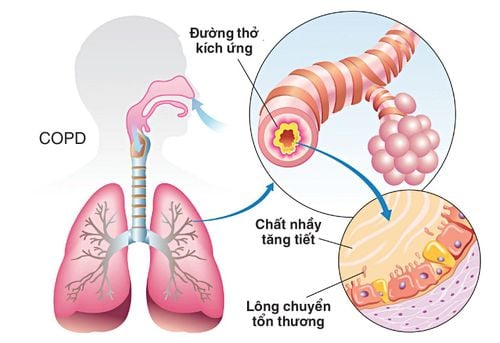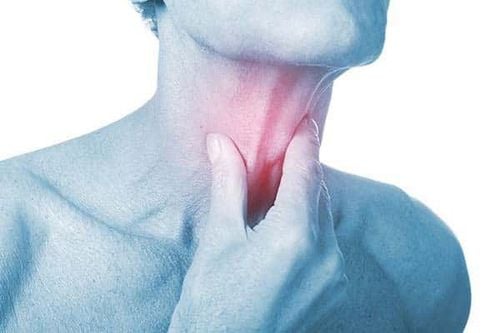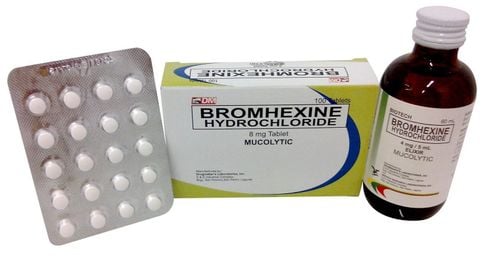A phlegmy cough is a common condition in infants. If left untreated, it can impact their respiratory system in the long term. Treating phlegmy cough in infants should follow the doctor's instructions carefully to avoid serious consequences from overusing medication.
1. Using Cough Medicine for Infants with Phlegm Cough
Treating phlegmy cough in infants depends on both the sound of the cough and the child's age. Specifically, if the child is under one month old, using cough medicine for phlegmy cough is not an option, as most labels clearly state that these products should not be used for infants.
If the child is under two years old, never give them cough and cold products containing decongestants and antihistamines without consulting a doctor. However, there is some debate about whether cold medicine is effective in treating cough. A comprehensive review of studies concluded that there is no substantial evidence that common cough medicines are effective in acute cough. Additionally, cough syrup is known as a combination medicine because it can treat more than one symptom. This means that cough medicine is also more likely to cause side effects and carries the risk of overdose when used without a doctor's guidance for young children.
Therefore, one of the ways to treat phlegm cough in infants is to use cough medicine. Cough medicine can help reduce the cough, but parents should not use it for children under four years old, as it can be harmful. Instead, prioritize non-medication methods to treat phlegm cough in infants.
2. Natural Remedies for Infant Phlegmy Cough
In addition to treating phlegm cough in infants with medication, there are several natural remedies that can be done at home without the need for medication. Parents can refer to the following options:
2.1. Humidifier
A humidifier helps to loosen mucus, which can reduce coughing and congestion in young children by adding moisture to the air they breathe in.
Cool mist humidifiers are recommended for children for safety reasons and are considered as effective as warm mist humidifiers. Run the humidifier during the day when the child is awake and in the room where they sleep at night.
If a humidifier is not available, parents can have the child sit in the bathroom with the hot shower running, which can help reduce airway congestion, loosen phlegm, and make it easier for the child to breathe.
2.2. Honey
Parents can give children aged one year and older a homemade remedy for reducing phlegm cough by using honey dissolved in warm water with lemon.
Honey can fight infections due to its natural antibacterial properties. Additionally, it is an effective way to soothe a sore throat. However, avoid giving honey to children under one year old due to the risk of botulism.
2.3. Hydration
Keeping the child's body hydrated is important when they have a phlegm cough. Fluids help keep the airways moist and help the body fight illness, as well as help to thin the phlegm.
Therefore, parents should ensure to provide water, breast milk, or formula regularly when the child is unwell and has a phlegm cough. However, parents should not give water to infants under six months old, as it can lead to hyponatremia, a condition where the sodium levels in the blood are abnormally low.
2.4. Saline Nasal Drops
One way to treat phlegm cough in infants is to use saline nasal drops to help clear the nose, thin the phlegm, and make it easier to cough up. These drops are beneficial when the child has a cold, as they help soften the mucus and make it easier to expel.
Saline drops are considered safe and can be used with a nasal aspirator or tissue for infants. To apply saline drops, tilt the baby's head back, then squeeze the drops into each nostril. Repeat if necessary to help reduce congestion and phlegmy cough, especially before putting the baby to sleep.
2.5. Elevating the Head
Elevating the infant's head while sleeping can be effective in preventing postnasal drip, which stimulates phlegm cough. Compared to lying flat, mucus is more likely to accumulate at the back of the throat, leading to more coughing to expel it.
However, parents should note that pillows are not recommended for infants and toddlers. Therefore, avoid using high pillows for children under one year old, as it can cause spinal injury. Instead, parents can use an appropriate inclined surface for the child, which not only helps reduce phlegm cough but also helps limit regurgitation in infants after feeding.
3. When Should an Infant with Phlegm Cough See a Doctor?
Typically, cold and phlegm cough symptoms in your child will subside after a few days, especially when applying the methods for treating phlegm cough in infants mentioned above. However, if your child's symptoms worsen, you should seek the advice of a doctor, especially for children under 6 months old.
An infant with phlegm cough should be examined if they:
- Have a cough lasting more than 10 days.
- Have a fever above 38.5°C for more than three days.
- Have pus discharge from the nose or ears.
- Lethargic.
- Breathe rapidly or with difficulty.
- Wheeze.
- Refuse to feed.
- Cry continuously.
- Show signs of respiratory distress, such as bluish skin and mucous membranes.
At this point, the doctor will determine the cause of the infant's phlegm cough and provide appropriate treatment. If the child's cough symptoms do not improve or worsen, it may be due to another underlying condition. The pediatrician will assess the child's breathing rate and may request a chest X-ray to identify the cause.
Some children may experience chronic phlegm cough due to allergies or asthma. If the doctor suspects allergies, they will refer the child to an allergist to determine the exact cause and provide preventive treatment.
In summary, cough is a very common condition in young children. Children's coughs often last long, but if symptoms improve with home remedies for treating phlegm cough in infants, the child will likely recover soon. Therefore, parents should not use over-the-counter medications for their child without a doctor's advice. Additionally, if symptoms do not improve or begin to worsen, inform the pediatrician so the child can be examined and treated appropriately.
To arrange an appointment, please call HOTLINE or make your reservation directly HERE. You may also download the MyVinmec app to schedule appointments faster and manage your reservations more conveniently.
References: verywellfamily.com, timesofindia.indiatimes.com, .medicalnewstoday.com, healthychildren.org













